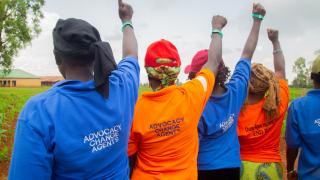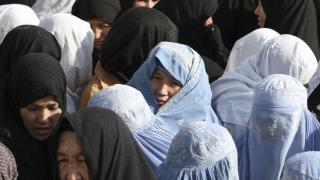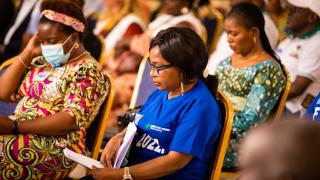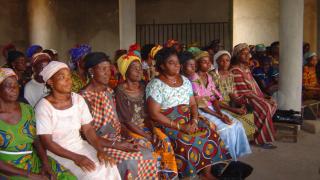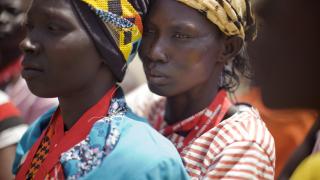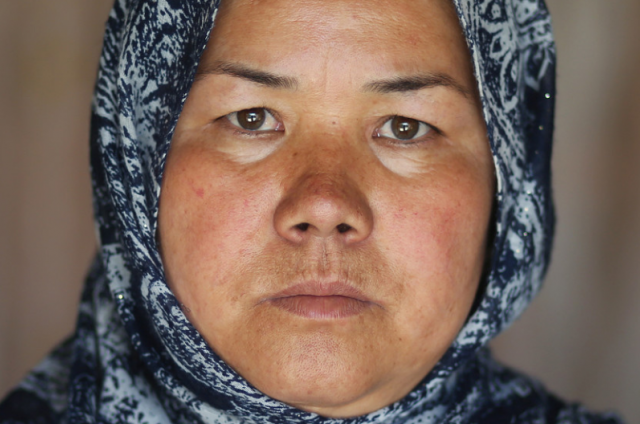Community attitudes towards violence against women in conflict affected countries
Globally, one third of women (736 million) have experienced physical and/or sexual violence, especially in fragile and conflict-affected states (Source: UN women).
Violence against women occurs every day and people now see it as a normal thing because when it happens, nothing is being done.
Ending gender-based violence is integral to achieving Goal 5 of the Sustainable Development Goals (SDGs) on gender equality. It is a prerequisite for becoming a fair, just and democratic society.
At Women for Women International, our holistic approach to programming strives to reduce the incidence of violence against women (VAW) by raising awareness of women’s rights and strengthening whole-of-community action against VAW.
Too many people believe it is okay for a husband to beat his wife, even for something as simple as burning dinner. Right now, VAW is powerfully ingrained in the patriarchal laws and cultural norms which influence women’s lives and their experiences of violence, publicly and privately.
When VAW is normalised through community attitudes, it means that community members – men and women alike – hold beliefs that justify acts of VAW and hold women responsible for their own abuse by putting the burden on them to avoid violence. We must all work to address the harmful social norms and patriarchal legal and political systems which normalise this violence and stigmatise speaking up against it.
Our research in communities across Afghanistan, Democratic Republic of Congo (DRC), Nigeria and South Sudan illustrates the community attitudes and policy implementation gaps that perpetuate the harmful practices of physical domestic abuse, rape (including marital rape) and economic deprivation.
Explore our policy briefs
Read our policy briefs on community attitudes towards violence against women
Who did we speak to?
Afghanistan
- In-depth interviews and focus group discussions in 2019 with 12 community leaders and 40 community members – men and women – on their attitudes towards and knowledge of violence against women in their communities
- Key informant interviews with 22 participants across 13 provinces in May 2020 to learn about the impacts of COVID-19
- Phone-based surveys with 80 former participants in November 2021 to learn about their lived realities following the regime change
Democratic Republic of Congo
- In-depth interviews and focus group discussions in 2019 with 10 male and female community leaders and 59 community members in Kamanyola and Luciga communities
- Phone-based surveys with 40 programme participants and graduates in April 2020 across 10 communities in South Kivu to learn about the impacts of COVID-19
- A series of nine couples’ dialogue sessions between 93 couples in Bwirembe and Luberizi conducted between July and October 2021
nigeria
- In-depth interviews and focus group discussions in 2019 with 12 male and female community leaders and 59 community members from Riyom and Pankshin local government areas
- Key informant interviews with 20 participants across 10 states, and phone-based surveys with 722 current and former programme participants in Plateau, Bauchi, and Kaduna States in May 2020 to learn about the impacts of COVID-19
- Programme data collected between 2020-2021
south Sudan
- In-depth interviews and focus group discussions conducted in 2021 with six male and female community leaders and 60 community members in in the Jasnsuk, Sobe, Jigomoni communities in Yei River State
What's in the policy briefs?
Each context-specific brief synthesises findings on the themes of community-acceptability of:
- Economic and financial control
- Physical violence against women
- Rape, including marital rape
- Community interventions
- Compliance with laws versus traditional local customs
- Community resources and support available to women experiencing violence
- Policy and programme recommendations

